Call for Submission: A Shadow Map/An Anthology By Survivors of Sexual Assault
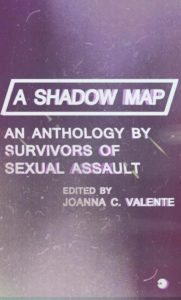


In this dumpster fire of an election year in the United States we have heard a lot of dangerous #rapeculture rhetoric from Donald Trump. After Trump’s “grab them by the pussy” statement, writer Kelly Oxford responded on Twitter, putting a solicitation out for people to name their first sexual assaults (which certainly are/were probably not their last). Read the NPR article HERE. The response to her call was/is overwhelming, staggering, heartbreaking, and not in the least surprising to other folks who have also had these experiences and/or are aware of every facet of this culture. As Oxford stated in her tweets, these stories are not just dry, dead statistics, these stories are true, horrifying, and all too common. This is a reality for so many people.
In a poignant and much needed call for submissions, Joanna C. Valente, the new Managing Editor of Civil Coping Mechanisms, is editing an anthology called A Shadow Map: an Anthology by Survivors of Sexual Assault, to be published in February 2017 by Civil Coping Mechanisms.
Here are some words from Valente and CCM: READ MORE >
25 Points: If I Really Wanted to Feel Happy I’d Feel Happy Already
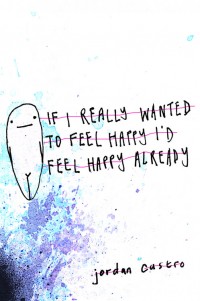 |
If I Really Wanted to Feel Happy I’d Feel Happy Already
by Jordan Castro
Civil Coping Mechanisms, 2014
162 pages / $13.95 buy from Amazon
|
1. This book and it being read by me results in me saying that Jordan Castro is like a really cool stand-up comedian sometimes.
2. A thoughtful, off-beat, occasionally philosophical stand-up comedian who plays to small audiences of people who are ‘in the know’ but could sell out bigger shows but perhaps wouldn’t want too but might think about it a little bit but wouldn’t want too.
3. The title is another one of those fucking ace, long titles isn’t it. Have you read it (see above)? Good isn’t it. Becoming something of a tradition isn’t it – the long, good, title.
4. Castro is…no, no I’m not going to call him that. Not going to just call him by his surname like they do in reviews. It feels a bit like a teacher talking about a pupil or a factory owner (A factory owner? Fuck! What century am I in?) talking about a worker in a slightly patronising way. So, yeah. Jordan Castro is a fan of circular reasoning, it pops up throughout the book. He gets all circulus in probando (Wikipedia) on our ass all the time.
5. Or maybe he’s not a fan of circular reasoning. Maybe these things trap him and impede his life like they do with all of our lives and he finds it’s best to try and write about them to circumvent this trap slightly and if we read him we can slightly circumvent our own circular traps. Just slightly. I don’t think he’s trying to write a miracle cure.
6. This book isn’t a miracle cure. Never believe in miracle cures. They don’t exist. They’re all scams. This book isn’t a scam. This book is upfront about things, about everything that’s going on in the minutiae of everyday life. It’s not a miracle cure but it might help. Plus it’s really funny and entertaining too, which helps.
7. The tale of a character named ‘Sarah’ that starts on p.95 is the tale of everyone nowadays who is under 40 and many over 40 and soon everyone in the western world and later everyone in every other type of world (this latter depends on a few things that are currently, to put it politely, ‘in flux’ in global affairs) but they won’t all be named Sarah.
8. In this one:’got a lot of allergies/been thinking about literature/for maybe five hours’, he’s secretly thinking about the sounds of words at the end of lines like an old fashioned poet but is hiding it even though he’s made it really subtle and really good.
9. Pages 115-119 make me realise that social media is so bedded-in in America that people really do view it as part of their real identity and really do agonise about what statuses they type and how they’ll be perceived and how many ‘Likes’, ‘Comments’, ‘Notes’ or whatever it will/should get in a way that is only really just starting to happen in the UK and in a way which sometimes depresses them.
10. I read somewhere in an interview with Noah Cicero (it could’ve been from ages ago, he might have changed his opinion by now, I don’t know. Anyway, he’s entitled to his opinion) that he didn’t really rate David Foster Wallace as being too much to do with Alt-Lit type of stuff but point number 9 makes me want everyone to read this essay by David Foster Wallace on television and then for someone else, someone who is still alive, and someone who, like me, doesn’t have to work full-time to re-write that essay, updating it for today’s social media landscape and for us all to see how prescient it was in the first place.
October 13th, 2014 / 12:00 pm
25 Points: Matt Meets Vik
 |
Matt Meets Vik
by Timothy Willis Sanders
Civil Coping Mechanisms, 2014
164 pages / $13.95 buy from Amazon
|
Or ‘Rich Meets Vik’ to review ‘Matt Meets Vik’ as Richard Brammer teams up with his girlfriend ‘Vik’ (Victoria Brown) to review this book.
1. Vik: At the end of the book, I didn’t expect it to be the end and kept turning (scrolling) the pages thinking there would be another chapter. When I realised that it was the end I was pleased at the way it ended.
2. Vik: I’m a woman so I don’t often get to hear a man’s raw thoughts. I liked that this book put me in the position to see male thoughts. I assume that they are real-ish male thoughts.
3. Rich: Shit! I haven’t started reading the book yet. I’m going to read it and find out. I’m not sure but I think I have real-ish male thoughts to compare them to, as a scientific control.
4. Vik: The book is set when Snake was a big deal on Nokia phones. I never had a Nokia, but I remember the enthusiasm Nokia owners had for Snake.
5. Rich: I had one of those Nokia’s. Before that I had a Nokia 5410 or something (in about ’95 and this was before my impoverished dispersed family had a house phone even). I loved Snake though. I was as addicted to Snake as I could’ve been to anything 2-dimensional at that time. I used to commentate to myself about my own performance on Snake like it was a sport and I was a great renowned competitor.
6. Vik: Actually I did have a Nokia phone but it was such an early Nokia that it didn’t allow you to access your address book when typing a text message so you would have to memorise the phone number of the person you wanted to text when texting. Which was terrible.
7. Rich: Shit! There’d be v apathetic riots if technology was designed like that now. My first phone had a text facility but the network ‘didn’t support it’. Should we review this book now?
8. Vik: I read this book in about 4 sittings; it is 177 pages long. I read it really quickly.
9. Vik: I’m a woman named Vik but I didn’t identify that much with the character named Vik, in fact I identified as much with the character named Matt as I did with Vik.
10. Vik: There are other characters, Chantelle, Ralph, Lucas and Esme and maybe some more.
October 2nd, 2014 / 12:00 pm
25 Points: Black Cloud
 |
Black Cloud
by Juliet Escoria
Civil Coping Mechanisms, 2014
144 pages / $13.95 buy from Amazon
|
1. For some reason, I find this book really blackly funny sometimes. Maybe this is a strange reaction, I don’t know. More on this later.
2. Some of it is a bit like those bits in Breaking Bad where Jesse ‘falls of the wagon’ and goes back to taking drug and his house reflects it. I thought those bits in Breaking Bad were ok so this is a compliment.
3. This makes me think about something that may be culturally different between drug cultures in the US and drug cultures in the UK. In the UK, apart from in the eyes of the tabloid media, the law, etc., pretty much all drugs such as amphetamines, MDMA, weed, coke, acid, even, are all pretty much seen as sort of fairly clean-living party drugs and only heroin and, probably, crack are sites of visceral misery-literature style affairs, sites of crack-dens, heroin hangouts etc. The party drugs are just fine and clean-living things to anyone initiated into them with no sort of self-hatred or self-development or depression surrounding them necessarily because that’s reserved just for heroin and crack alone in the UK. This is my experience anyway but maybe everyone else in the UK would disagree. It just makes me wonder about the cultural differences as far as drugs are concerned and this book is a great example of that. Why not be honest about a common drug culture in US literature as this book and most Alt-Lit does, it screws up all those ‘wholesome’ Christian-Right bullshit images of religious-corporate America so that’s a good thing.
4. A point related to this. 12-step therapy seems different here in the UK compared to the US but also pretty similar. I like to feel these cultural differences.
5. Points 3 and 4 are maybe a thing for Alt-Lit more generally rather just this book but this book does do a good job of exemplifying something that I’ve been trying (and probably failing to articulate) and how wrong I was. More on this later.
6. “Therapists have looked at me, their eyes pleadingly wet and round, and said that growing up in a household like mine must have not felt that strange because it was all I knew. I can’t say this was true for me, not quite, because I do remember the pliancy of things, how nothing ever felt like it was happening at the right time or would stay standing up”. This is one of my favourite lines in the book because it’s also happened to me, as I grew up in a similar situation as the character in this story/author (the membrane is thin in this book, I’m guessing) and it feels true and I know it to be true and what more can you want sometimes from fiction if not some kind of truth?
7. The films that accompany this book are fucking ace by the way. Search them out on Vimeo. They’re some of the best films I’ve seen accompanying a book. I like films that accompany books. These are quite Lynchian at times and other times like a Kate Bush video somehow.
8. “Then my mother took me across the hall, closed the door, turned on the record player, Jane’s Addiction (I still hate that band)…” This is my second favourite, no my equal favourite, line in the book (from the same story – maybe I’m biased, maybe it’s why I said I found quite a bit of this blackly funny?) again because it is so true. I must be older than Julia because mine was Bob Dylan and Neil Young both of which I like now, wounds heal occasionally or sometimes you realise that it was just two contexts mixing up in an unfortunate way. Childhood memories are like this (good or bad ones, although in reality they’re always mixed) and she captures it beautifully and economically in that simple Jane’s Addiction detail. I’ll vote for this book all day on the strength of that detail.
9. This entire book isn’t blackly funny to me, by the way. Although, I wasn’t being flip when I said that, some of it is (but maybe I’m biased towards it). It couldn’t be blackly funny throughout to anybody. Some things are very sad in it, occasionally brutal. The ambivalence of life is herein. It oscillates at times, like most of, like some of, life does between extreme visceral misery and extreme visceral joy.
10. If you want poetry, consider the comparison between the two images of a mother on page 57 — one where she is modelling in a magazine and the other where she is “dirty and buzzing in the bright morning light” READ MORE >
August 26th, 2014 / 1:24 pm
Green Lights by Kyle Muntz
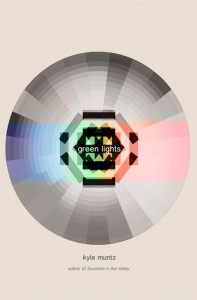 Green Lights
Green Lights
by Kyle Muntz
Civil Coping Mechanisms, May 2014
108 pages / $13.95 Buy from Amazon
In Kyle Muntz’s Green Lights, we’re exposed to wavelengths as beams of prose, an unnamed narrator whose world is flooded in the disparate hues of existence. There’s a meditative quality throughout, a detachment borne of Kafkaesque inquiry and a yearning for communication that teeters on the fiat lux’s of every day creation. Not just through visible light, but the invisible nanometers that escape normal sight. “I want to talk about color,” the book begins, and the colors of the spectrum quickly become a metaphor for revelation and metamorphosis. The characters, from the moon turned into a woman, to an old man embodying evil, become symbolic accoutrements for the journey which turns out to be an excursion to another dimension. Elements of the fantastic shine as in the “Blue” chapter when the whole neighborhood is covered in noirish film shades that masquerade as night, and then, “The world froze… Ice had taken over the world.” Winter isn’t just the congealing of the veins and muscles, but a coat of futility wrapped around his routine actions. “After much effort, I thawed my room. I’m not proud of the things I did to accomplish this,” he confesses, then further reveals, “I got a job carrying a flamethrower around the neighborhood, melting people. My coworkers treated me like shit.” The frost of survival is just as bleak as the cold treatment of his colleagues and the blending of colors weaves the conflagration of pain with the inferno of transformation.
There’s a melodic beat to Muntz’s writing, terse descriptions of events interspersed with sudden bursts of graphic visuals, often macabre in its evocations. It’s a delicate balance, but one he masterfully navigates, exploiting minimalism to maximize emotional defibrillations, injecting the grotesque to animate the mundane:
“One time when I was walking in the darkness, I stumbled over something, and it was him, sprawled on the ground, unable to move. He didn’t have eyes anymore. Maggots crawled amidst the remnants of his skin, fibrous muscles like totted spaghetti. Worms fucked his intestines. Beetles were chewing his brains.”
Like signal lights, there’s a revolving flow of ideas that are given free rein and then brought to a halting stop, warning yellows demarcating the blurry boundaries between illusion and reality. That border is often where Muntz’s narrator lingers, rarely surprised by the absurdity of the surreal events that happen around him, instead, levitating past the barriers. It’s almost as though the green light were always on and physics broken free of limitations to innovate. Muntz revels in experimentation, relishes the opportunities to change up the traditional narrative as he bakes x-rays of playful contemplations into the atlas of his construction:
“Sometimes when I looked into the distance, I remembered that the darkness I could see there was actually the mountain, holding up the base of the universe. If I were to walk that way, the neighborhood would never end, but eventually it would become less real… The road continued even where the world began to change colors.”
His main companion is his love interest, E, who is as curious as the narrator about the frontier, a geography that challenges the intellectual as much as the physical. Both are intertwined and both affect each other, a symbiotic terraforming that is volcanic in its effect.
“Nearby, behind an abandoned house, we found an immense flower growing from the ground. The flower was at least a hundred feet tall. Beads of water clung to its sides… She nodded. ‘It looks like a picture of itself, meaning it looks better than real. That means something. It implies amazingness.’
‘Should we climb it?’
‘Probably,’ she said. ‘If we didn’t, we would feel bad about it later.’”
There’s a lot of climbing in Green Lights and like E, we know we’d feel bad if we didn’t venture upward. Along the way, we get dashes of the videogame classic, Earthbound, embedded with David Lynch, Borges, and doses of Marquez. The combination acts as a variety of hues to assault our senses in this quirky and likable hike while at the same time, Muntz weaves his own identity through the narrative. I just wish there were more colors in the spectrum.
***
Peter Tieryas Liu is the author of Bald New World and Watering Heaven. He entropies at entropymag.org. He loves green lights. And red ones. And blue ones too.
July 21st, 2014 / 10:00 am
Addicts & Basements by Robert Vaughan
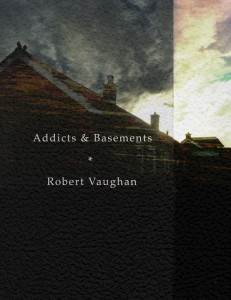 Addicts & Basements
Addicts & Basements
by Robert Vaughan
Civil Coping Mechanisms, February 2014
142 pages / $13.95 Buy from Amazon
While waiting for clothes to dry in a dingy, low-maintenance laundromat—leaning beside an out-of-service soda machine was a discolored Fisher-Price Playset (in case anyone wanted to conveniently scare/scar the hell out of their kids)—I tore into Addicts & Basements, Robert Vaughan’s slim collection of brisk, tightly-constructed miracles of human endurance both humorous and sad (often beautiful), as coin machines, some entirely gutted, struggled haphazardly against insurmountable odds:
A man is mailed his ex’s pubic hair; a lonely waitress perusing personal ads becomes smitten by Bondage Man; a father kidnaps two siblings who may or may not be his kids; and a husband surfs porn sites while wearing his medicated wife’s panties.
Vaughan’s talent in handling the plights of characters many would write off as pathetic grotesques is masterful, and he does it with love and sincerity:
He decided to give it a whirl in the toilets of Grand Central Station. He stopped by Wigs and Plus on 14th Street where the owner, Sunny, would sell him a cheap piece “for his mother.” Then he’d prop himself in the furthest stall from the door every Sunday morning. Wig in place. Like a parishioner. Or a TV evangelist. Or a congressman.
When it comes to flash fiction (those brief, punchy, not-quite-prose-poems) Vaughan is an upper-level video game boss. “Gauze, A Medical Dressing, A Scrim,” with its impeccable comedic timing, might be one of the best I’ve ever read. “Neighbors,” about two suspicious pet owners, isn’t too shabby either:
He likes her smile, imagines seeing those guinea pigs ripped into shreds. He untangles the leash. “C’mon, boys.” He imagines what she looks like covered in whipped cream. Even her heels. They keep laughing.
“On the Wings of a Dove” turns the nightmare juice up to 11 with Vaughan’s haunting tribute to Matthew Wayne Shepard, a young man tortured and killed by homophobes in Wyoming:
his coma was so quiet,
one of the killers would
later say, you could almost
hear ice rattling down the canyon
July 11th, 2014 / 10:00 am
25 Points: Black Cloud
 |
Black Cloud
by Juliet Escoria
Civil Coping Mechanisms, 2014
144 pages / $13.95 buy from Amazon
|
1. Juliet Escoria, as a writer, is like a birthday present you didn’t expect to get but secretly hoped you would.
2. It’s hard to pick a “favorite” from Black Cloud—but my top three would probably be “Heroin Story”, “Reduction”, and “I Do Not Question It”.
3. I feel like I know all of Escoria’s characters. I empathize with them. I care about them. I want to fuck up all the shit that made them miserable because, to me, they deserve better.
4. There are stories within these stories—little hints into the lives of these characters that stick with you.
5. Playlist for this book: Gary Jules’ version of “Mad World” on repeat.
6. Feel like Escoria is a new-age Bukowski but is extremely new and original at the same time.
7. These stories seem so real that I can’t decide if Escoria actually lived through all this or not. (Probably took experiences from her own life to build around these stories—that’s obvious—but I’m more so troubled with the idea that her life has been that awful thus far.)
8. Declaration: Black Cloud is the best work produced by a new, young writer this year and I challenge anyone to top it. (Spoilers: you won’t.)
9. Black Cloud makes you realize how good your life is.
10. Sadly, a lot of Generation Y can relate to the absence of fathers in this story collection.
June 26th, 2014 / 12:00 pm
Noir: A Love Story – An Interview With edward j rathke
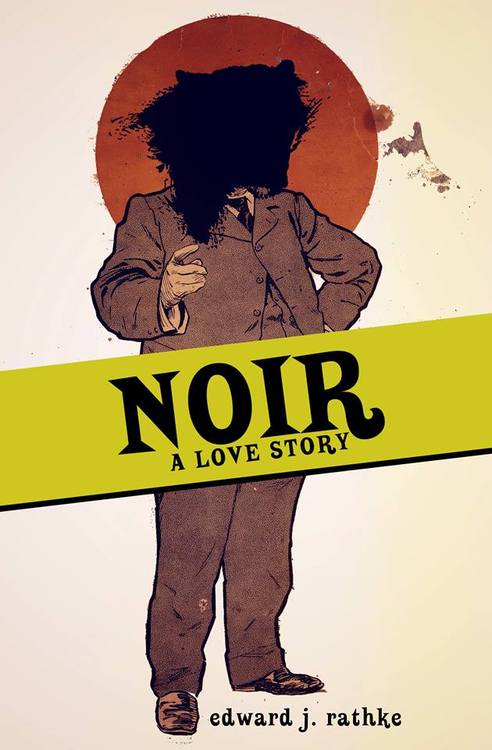
Noir: A Love Story by edward j rathke is forthcoming this summer from Civil Coping Mechanisms, and I had the opportunity to pose Edward J Rathke some questions inspired by his phenomenal book.
***
What’s your real name?
I used to hate my real name. I used to hate it so much. I hated the way it looked on paper and I hated the way it sounded, rolling round my ear, those two stupid hard consonants just a few letters apart. I’ve made a thousand names for myself over the years and most of them nothing like mine. I lived in worlds that only existed inside my head and I made me new. For a long time I hated my face too and I avoided mirrors like they were plagued and I stopped remembering properly what I look like, and this problem persists. The person I see with my name when I close my eyes isn’t the one who smiles back in the mirror. Even my dreams stopped being about this name and this body. I became other men and other women and I dreamt in their bodies, with their names.
Now I’m comfortable with the name I was given so long ago: edward j rathke. I even have a supervillain name ready for whenever I fracture apart and try to take the world apart: Wrath Key.
But is edward j rathke the best at answering these questions? Probably not. He’s a very silly human, though he sort of writes the opposite of silly books. Sometimes he wishes his novels had more silliness, way more zaniness, but we suppose writing is where those heavier parts of him go so that he can go on living silly, lightly, while we write on, Deathly.
What’s the story you always tell? What’s the story you’ll never tell?
I don’t know if there’s a story I’m always telling people. Probably there is, but the ones I feel like people are always asking me about are the ones where I almost died. Like the time I took a 60 foot freefall onto rocks or the time my appendix exploded while I was in Korea and I spent a week in a hospital where no one spoke English. Most of my stories involve me being lost and making bad decisions.
There are so many stories I’ll never tell but not because of fear or shame or regret. There are memories that are sacred to me. In many ways they’re all we have as humans. Our life is just a collection of memories, and memory is largely a creative process of stitching together misremembered moments. When you share a memory, it stops being yours. So when you speak your memory into new ears, that memory becomes theirs, and in that transference, the memory changes twice [first by making it into words and then again by the person hearing those sounds, stitching it to the fabric of their life] and becomes something new. If they share that memory, it again transforms, and so when your memory is shared with others, it stops being yours and becomes something wholly different than who you are, which is a body housing memories. And so I keep the best ones inside and I share them with no one. Not even in my fiction, and definitely not in interviews like this.
Most of them are about love. Those howling bits of time, fraying, hoping.
And maybe Noir: A Love Story is both. It’s full of the story I’m always telling—the unknowable humanity, the howling ache chasming between us, the sublime perfection of existence, the beauty of its ending—and the ones I’ll never tell. All those stories I’ll never tell, those are the ones at the center of Noir: A Love Story. I’ve given you the impressions of lives but told you nothing about what they mean to the people who lived them, and so the reader decides and discovers. In that discovery, they’ll probably find the many mes that I’ve been all these years.
What does desperation make you do?
Desperation’s made me do a lot of things. I’ve lived a strange life full of stranger existential crises. Desperation sent me to Ireland and South Korea. It’s sent me wailing into the night. It’s sent me down roads of destruction, but I’ve also poured it over thousands of written pages. When I was younger I didn’t sleep really at all—still don’t, I guess, though mostly out of habit—and that was something deep and dark gnawing at me all my life. Then while still too young I spent those sleepless nights drinking, causing chaos, writing terrible poetry and screaming it into the sunless sky, breathing smoke on rooftops.

“Time eats you. Dead or dreaming” What else?
I have strung wires from steeples to stars and tightroped across the sky. READ MORE >
Green Lights
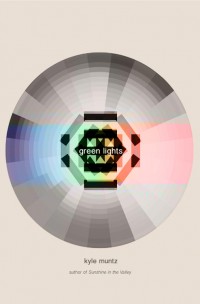 Green Lights
Green Lights
by Kyle Muntz
Civil Coping Mechanisms, 2014
108 pages / $13.95 buy from Amazon
Rating: 8.5
To give the reader a dream on paper—that’s what sur-realist writing’s about, and Kyle Muntz’s new novella Green Lights (out 5/5/14 from Civil Coping Mechanisms) does it well. It sits nicely next to Jesse Ball’s Samedi the Deafness, Paul La Farge’s The Facts of Winter, and Shane Jones’ Light Boxes in my imaginary library of dream-novels. READ MORE >
May 13th, 2014 / 12:00 pm
An Interview with Gabriel Blackwell
I interviewed Gabriel Blackwell this weekend. We talked about his new book, The Natural Dissolution of Fleeting-Improvised-Men: The Last Letter of H.P. Lovecraft, which is a strange, scary, and above all absorbing novel about the final days of said author of the weird. We talked about our experiences with Lovecraft and Lovecraft fanfiction, Mexican men’s shelters, why we don’t like House of Leaves, and writing “objectively,” among other things. Please watch and enjoy. Then buy his books.
